

Reinhard Andress
In 1869, the German-American medical doctor and poet, Eduard Dorsch, wrote a poem read in Detroit on the occasion of Humboldt’s 100th birthday. This article publishes the poem for the first time and explores its context within the life and times of its author.
En el año 1869, el médico y poeta germanoamericano escribió un poema ocasional leído con motivo del 100º cumpleaños de Humboldt. Este artículo publica el poema por primera vez y explora su contexto en la vida y el tiempo del autor.
Im Jahre 1869 schrieb der deutsch-amerikanische Arzt und Dichter Eduard Dorsch ein Gelegenheitsgedicht, das anlässlich von Humboldts 100. Geburtstag in Detroit vorgelesen wurde. Dieser Artikel veröffentlicht das Gedicht zum ersten Mal und erforscht dessen Kontext im Leben und in der Zeit des Autors.
Alexander von Humboldt’s enormous popularity in the 19th century as a naturalist and explorer is well known. In The Passage to Cosmos, Laura Dassow Walls describes the high point of that popular appeal in the United States:
The American cult of Humboldt climaxed in 1869, when a tsunami of celebrations of Humboldt’s hundredth birthday moved across the continent, from coast to coast, North and South, in great cities and small towns. In New York City, ships in the harbor were bright with bunting and buildings were hung with American and German flags and portraits of Humboldt; City Hall was bedecked with Humboldt banners and a crowd of twenty-five thousand – “two-thirds of them Germans” – gathered in Central Park to hear politicians, diplomats, professors and dignitaries give speeches and witness the unveiling of a bust of Humboldt; that evening, torchlight parades, concerts and banquets were held across the city. (Dassow Walls 2009: 304).
The author goes on to detail the many other North American cities and towns that held celebrations in honor of Humboldt’s birthday and concludes that September 14, 1869 “was a grand national holiday, proclaimed and celebrated in virtually every corner of the United States” (Dassow Walls 2009: 305).
Although Dassow Walls does not specifically mention Detroit, there were celebrations for Humboldt there as well, not at all surprising given the large number of German immigrants in the city, many of them having arrived in the wake of the failed revolution of 1848. They were so numerous that the part of Detroit where they settled, Germantown, was named after them. The celebrations for Humboldt were covered extensively, for example, in the Detroit Free Press, always one of the largest newspapers in the Michigan metropolis and the largest today. In an article dated September 15, 1869, which takes up roughly two and half of the six columns of the front page of the four-page daily newspaper, we read that “[t]he demonstration yesterday was the crowning event of the Humboldt centennial celebration in this city” (“Humboldt Centennial” 1869: 1). The elaborate procession is described that involved city dignitaries and representatives from various societies, many of them German-American. It culminated in Circus Park where Mayor Wheaton addressed those gathered in a speech commemorating “the birth and life of one of the most illustrious men the world has known” (“Humboldt Centennial” 1869: 1). In the evening, there were further celebratory events, including an address by Prof. Edward Feldner, Director of the German-American Seminary. After outlining Humboldt’s life and discipline of scientific mind, and calling for the founding of a “Kosmos University” as a “dome of science,” he wraps ups his words with a stab against the Church:
It is not to increase the number of places of worship, but to erect stores for the products of the mind everywhere for the use of the people, and then the high standing bishops and prelates may travel to the Ecumenical Council in Rome, and may make resolutions “that the Holy Father is infallible,” and then may Pastor Knak, of the Brandenburg Conference, once more declare that the sun goes around the earth, because the Bible says so. We are not afraid of the result. “And she moves nevertheless,” Galileo said; and so will say, I trust, hundreds of thousands of followers of the doctrines of Humboldt, who became satisfied that science finally must break down the dark walls of tradition and superstition. (“Humboldt Centennial” 1869: 1)
These were comments that fit into the general debate about Humboldt’s religiosity, or lack thereof, and the role of science that was ensuing in the United States at that time (cf. Dassow Walls 2009: 307ff.).
As we shall see, it is from these anti-clerical words that we can ultimately make the connection to Eduard Dorsch and his unpublished poem, spoken in Detroit on the occasion of Humboldt’s 100th birthday. We do not know exactly where the poem was recited, but with “Prolog” as part of the title, one can perhaps assume that it occurred in advance of other festivities, maybe in one of the German-American organizations listed by the Detroit Free Press as participants in the Humboldt centennial, for example, the Harmonie Society or the Concordia Society, to name just two (cf. “Humboldt Centennial” 1869: 1). The original manuscript of the poem, written by hand in Kurrent (except for the title in Latin handwriting, cf. fig. 1–4), is contained in the part of Dorsch’s papers that for unknown reasons made their way into the archives of the Lincoln Club, later the Germania Club of Chicago, and now held by the Chicago Historical Society.
Let me quote the entire poem first with some annotations, and then proceed to contextualize it within Dorsch’s life, other creative works and anti-clerical stance.
[transcription and facsimiles on the following pages]
Prolog
zur hundertjährigen Geburtstagsfeier
Alexanders von Humboldt.
Gesprochen in Detroit, Mich., von Herrn
L. Jansen, Sept. 14. 1869.
Vom goldnen Thor am stillen Meere
Bis an die Küste Windlands1 hin,
Vom nebeltrüben Land des Spleen2
Bis zum Altai und nach Cythere,3
Wird Humboldt’s Kommen heut gefeiert;
Begeistert krönen Ost und West
Den, der das Bild von Sais4 entschleiert,
Zum hundertjährigen Wiegenfest.
Wenn Dichter wir und Helden krönen,
Die Plektrum5 schwangen oder Speer,
Um wie viel würdiger ist er,
Der auch ein Fürst im Reich des Schönen!
Ein Fürst im Reiche der Gedanken,
Wie keiner noch erschien der Welt,
Seit Aristoteles die Schranken
Des Menschengeistes kühn zerschellt.
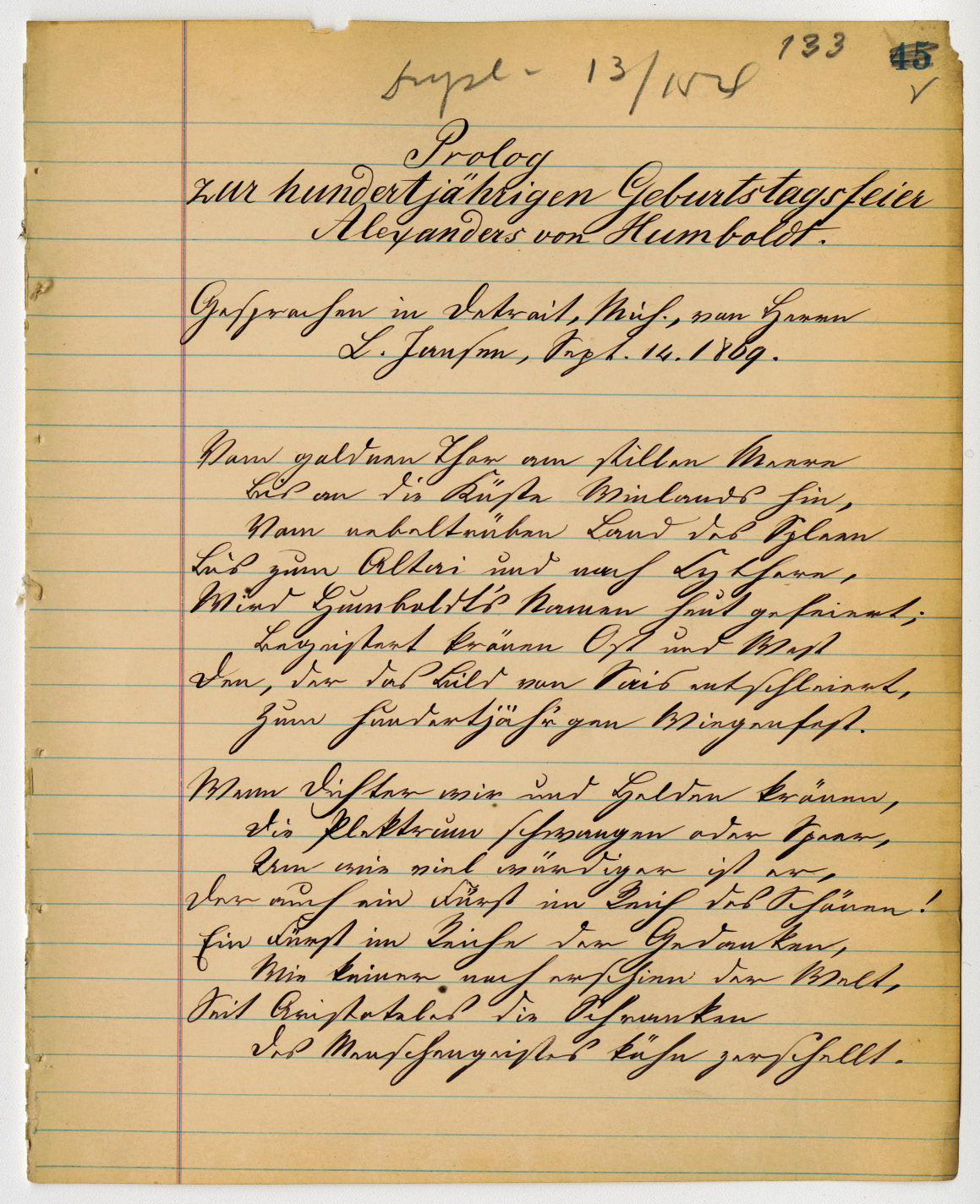
Fig. 1: Dorsch’s Unpublished Poem, p. 133. Source: Chicago Historical Museum
[134]
Bewehrt mit Kompaß und Bussole6
Zog auf Eroberung er aus,
Und gab, verachtend den Applaus,
Den künft’gen Forschern die Parole.
Hoch auf dem Chimborasso stand er,
Eis über ihm und Condorflug –
Ein Held war er, ein Alexander,7
Der siegreich seine Waffen trug.
Ob an der Küste von Cumana
Die Erde bebt, ihn rührt es nicht;
Ob Fiebergluth die Kraft ihm bricht,
Er stürmt den steilen Antisana.
Wenn ein Vulkan die Erde wieder
Zum Chaos schafft, – was hindert es?
Er steigt im Krater auf und nieder,
Ein glücklicher Empedokles.8
Erobernd fasst sein Geist die Welten,
Befreit vom alten Lügennetz
Das ewige Naturgesetz,
Das künftig nur allein wird gelten.
Hoch auf des Wissens Thron erhoben
Sieht er das reine Menschenthum,
Daß Geist und Welt in Eins verwoben,
Spricht laut sein Evangelium.
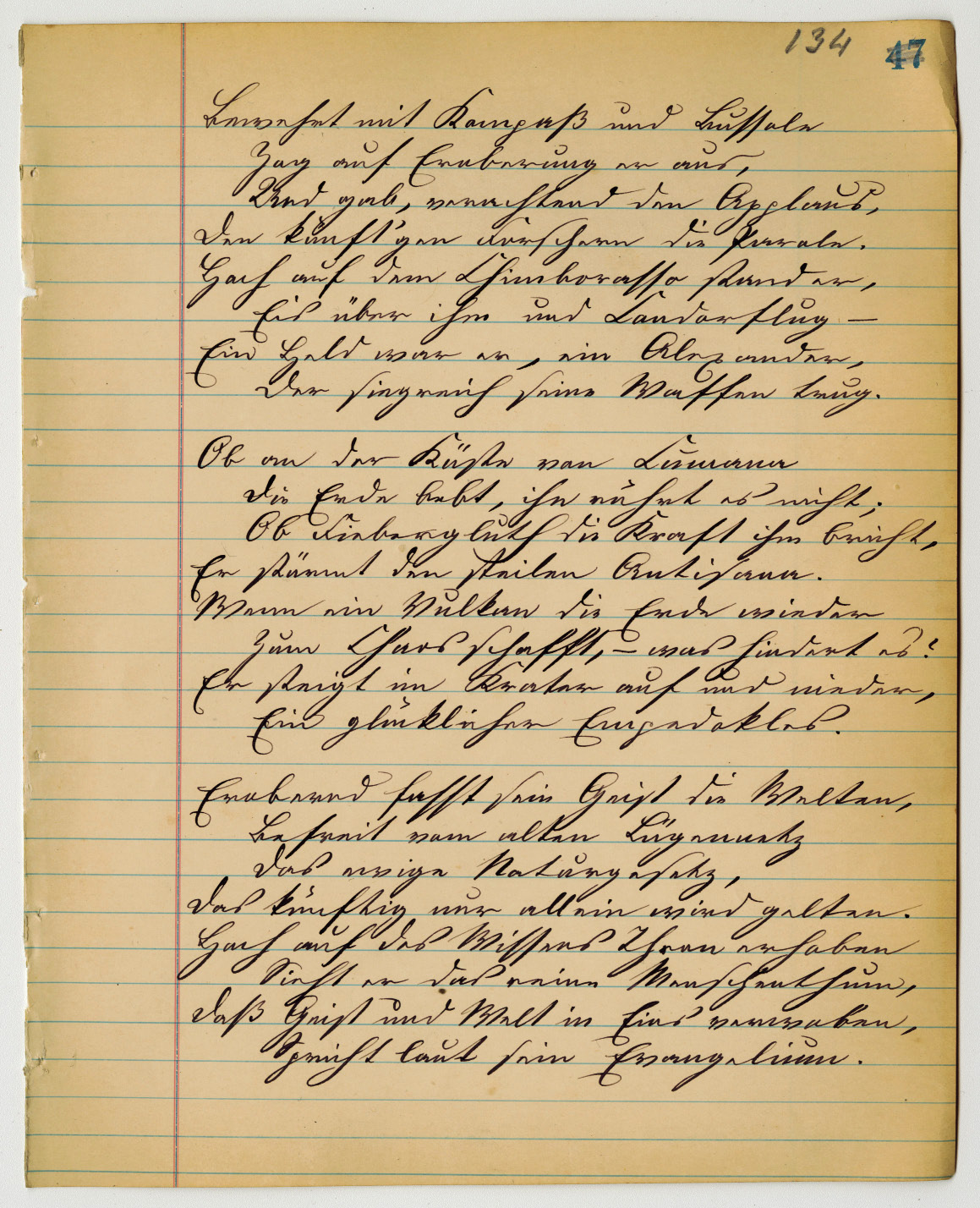
Fig. 2: Dorsch’s Unpublished Poem, p. 134. Source: Chicago Historical Museum
[135]
Wie eine Sonne hoch im Blauen
Geht ungestümt [sic] er seine Bahn,
Frei, ein Prophet des großen Pan,9
Auf Erdenmacht hinabzuschauen.
Was sind auch Eintagskönigreiche,
Drin nie die Sonne untergeht
Dem Manne, der in Göttergleiche
Erkennend vor dem Weltall steht?
Zum Erben aber seiner Thaten
Zum Erben deß, was er gedacht,
Hat er die ganze Welt gemacht,
Die Menschen all sind ihm Agenten
Für sie vom Baume der Erkenntniß
Hat er die reifste Frucht gepflückt,
Und seines Wissen frei Bekenntniß
Ist’s, was ihm heute die Stimme schmückt.
Wir feiern ihn, den Reformator,
Der auf den Trümmern einer Welt
Hoch das Panier der neuen hält,
Ein ruhmgekrönter Imperator.
Des Glaubens morschen Stab verschmähend
Geh’n wir auf unsres Meisters Spur,
Und folgen, selbst auch Wahrheit sprühend,
Dem Hohenpriester der Natur.
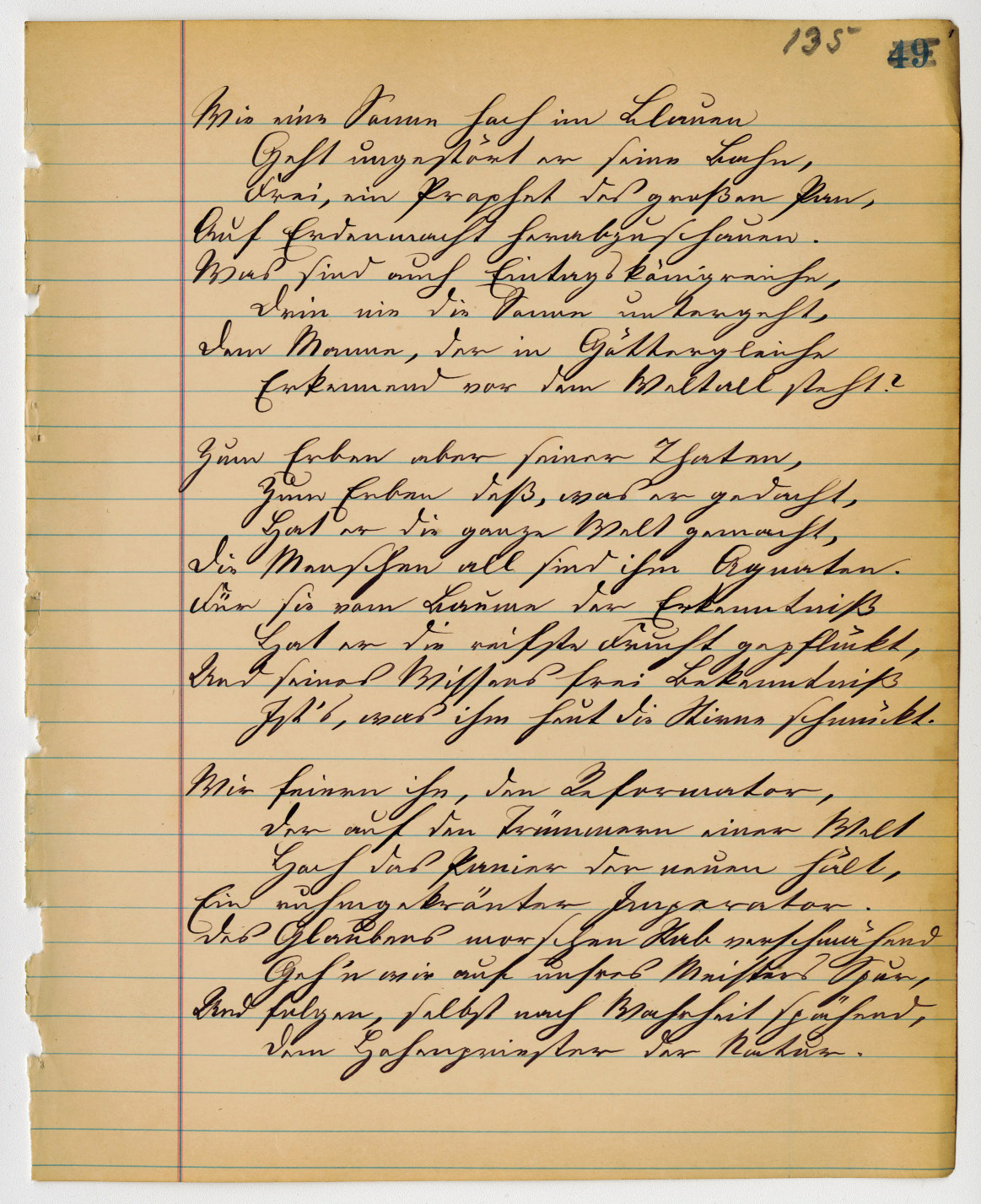
Fig. 3: Dorsch’s Unpublished Poem, p. 135. Source: Chicago Historical Museum
[136]
Und nicht mit Reden und Gelagen
Begeh’n wir nun sein Wiegenfest,
Wir müssen kühn und felsenfest
Sein [sic] Wert in alle Weiten tragen.
Nur dann sind würdig wir, den Manen10
Des großen Mann’s uns anzureih’n
Wenn wir auf allen Lebensbahnen
Des Lichts Apostel wollen sein.
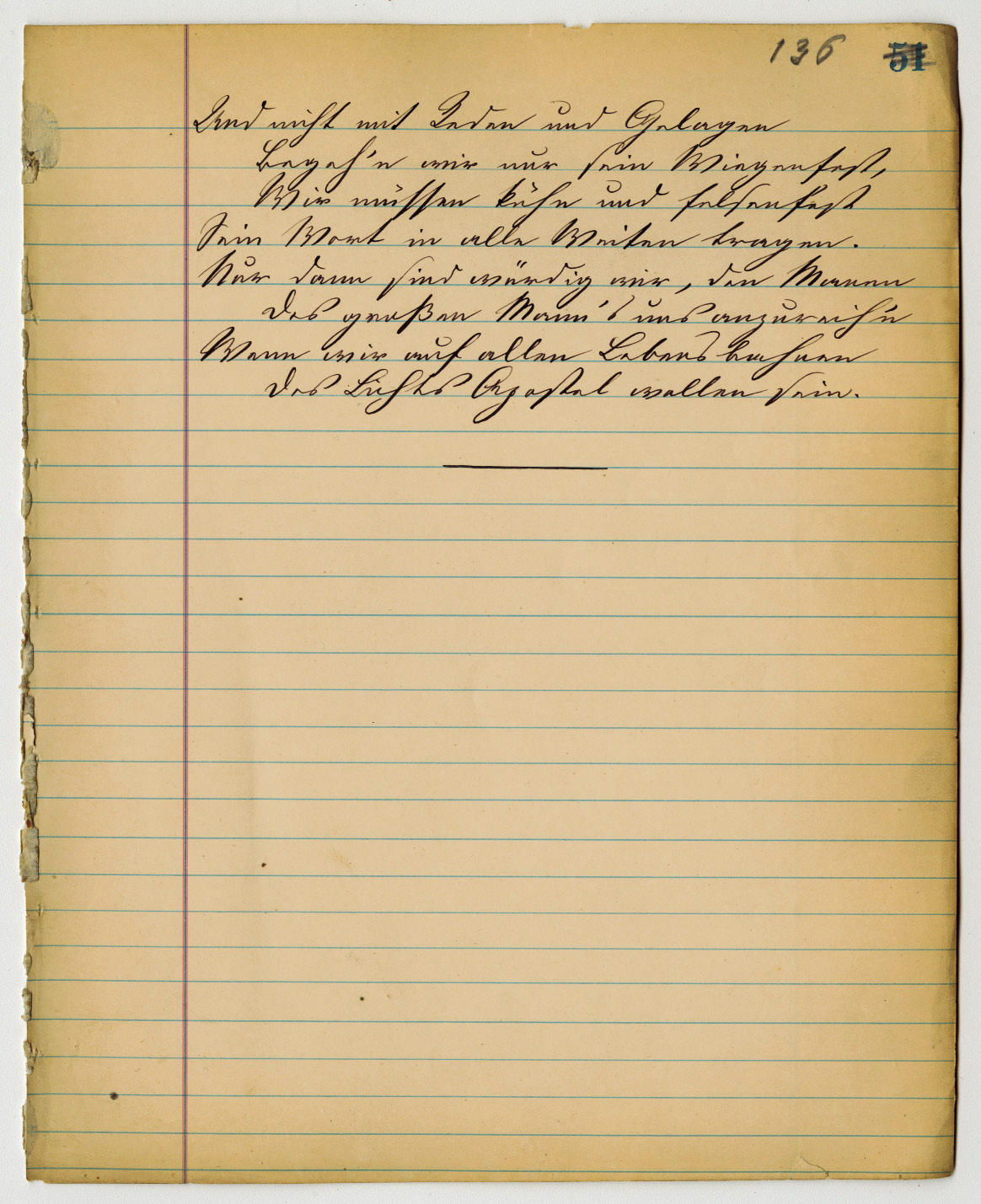
Fig. 4: Dorsch’s Unpublished Poem, p. 136. Source: Chicago Historical Museum
In a nutshell, the poem tells us the whole world has reason to celebrate Humboldt, here endowed with a quasi-divine and mythical status, for exploring heaven and earth, and unveiling the eternal laws of nature. As so often is the case in descriptions of Humboldt’s trips of exploration, South America dominates. In its final stanzas, the poem urges the readers to follow his footsteps and to continue the relentless pursuit of knowledge. The formal quality of the poem is at best modest with its often forced iambic meter, and stanzas consisting of enclosed (ABBA) and alternate (CDCD) rhyme schemes. These formal elements do not complement the poem’s content in any apparently meaningful way other than to add a measure of solemnity to the occasion of the poem’s reading, indeed, an “occasional poem” very much in the tradition of such writing. However, the literary allusions and imagery do suggest an author of considerable education in the spirit of a “Bildungsbürgertum” based on idealistic values and classical antiquity. Moreover, Dorsch had clearly read many of Humboldt’s writings and was obviously quite familiar with the breadth and depth of their importance for the development of science in the 19th century. How might such an individual as Dorsch have come to write this poem?
Born on January 10, 1822 in Würzburg as the son of Protestant parents, Dorsch attended a Catholic school and studied medicine in Munich, with strong additional interests in botany and philosophy, natural history and other sciences (the following biographical sketch is based on the following sources: Das Buch der Deutschen in Amerika 1909, Carlson 1928, Michigan, Monroe County Library System). After attaining his degree in 1845, he moved on to Vienna where he perfected his practical experience in midwifery. Under the influence of the Enlightenment, Hegel and the literary movement of “Junges Deutschland” with its progressive principles, Dorsch’s own insistence on the ideals of freedom and his anti-clerical positions often got him into trouble with the authorities, all the more the case with the reactionary forces at the time of the failed 1848 revolution. As a result, Dorsch decided to accompany a group of emigrants to the United States in 1849 as their physician. He was joined by his future wife Sophia Hartung (1827–1884), originally from Ingolstadt, as well as his mother and sister. After a short stay in New York, the extended family traveled to Detroit and on to the small town of Monroe, Michigan, where a physician was needed, all of this late in 1849. Somewhere along the path into exile, Dorsch and Sophia Hartung were married, and she gave birth to a son who died as a baby in 1850. In later years, in a “Sketch of my life,” Dorsch wrote enthusiastically of the new-found freedom in the United States:
What do those know of freedom, who have been born free. They do not appreciate it half as much as those who were born as subjects of a prince. Except in Switzerland who can move freely in Europe? Everywhere certificates are asked for. A Certificate of babtizing [sic] & vaccination is already necessary if the boy wants to go to school. No step is possible, the police is after you. No word can be uttered containing the least censure of magistrate or authority without risking punishment. And now I was free, could do & say what I pleased, as long as I did not interfere with the freedom of my neighbor! What a contrast! (Dorsch, date unkown).
In Monroe, greatly respected, Dorsch practiced medicine with increasing financial success, soon allowing him enough free time to pursue many other literary and scholarly interests. The ideals of freedom never left him, as can be seen, for example, in his anti-slavery, abolitionist stance. The practical consequence of his views was that Dorsch allowed his home to serve as a “station” for the Underground Railroad, a place for slaves to stay as they escaped from the southern to the northern states and Canada. He also functioned as a delegate to the first Republican Party Convention in Philadelphia in 1856 that nominated John Frémont (1813–1890) as their anti-slavery candidate, whom Humboldt supported from afar as well. Frémont ended up losing to James Buchanan (1791–1868), but the Republican Party was able to prevail with Abraham Lincoln (1809–1865) in 1861. Dorsch later also held a position on Michigan’s State Board of Education from 1872 to 1878, and for many years as a US Pension Board Surgeon. As the latter, he created charts to help trace the potential course of bullets through the human body. As mentioned above, his wide-ranging interests also extended into botany. For example, he is credited with planting the rare pink Egyptian and the yellow American Lotus in the marshes around Monroe. When his wife Sophia died in 1884, he remarried a year later to Augusta Uhl (1837–1914), another German emigrant. Overall, Dorsch seems to have been a very self-reflective, somewhat introverted individual, although he remained very connected to his social surroundings and community. Aside from his volumes of poetry, which will be discussed below, he regularly contributed articles of political, scientific or literary content to such newspapers as the Illinois Staatszeitung or such magazines as the Belletristisches Journal.
Dorsch died unexpectedly and exactly on his 65th birthday on Jan. 10, 1887, and lies buried in the Woodland Cemetery in Monroe (cf. fig. 5 and 6). The local newspaper, the Monroe Democrat, remembered him as follows:
He was an old school gentleman of the finest polish, an author of wide reputation – better known in New York, Boston, Philadelphia, Chicago and other literary circles as a botanist, scientist, and man of letters, than in Monroe. Here he was known to all as a learned physician and a man of the strictest integrity. (Dr. Edward Dorsch 1887).
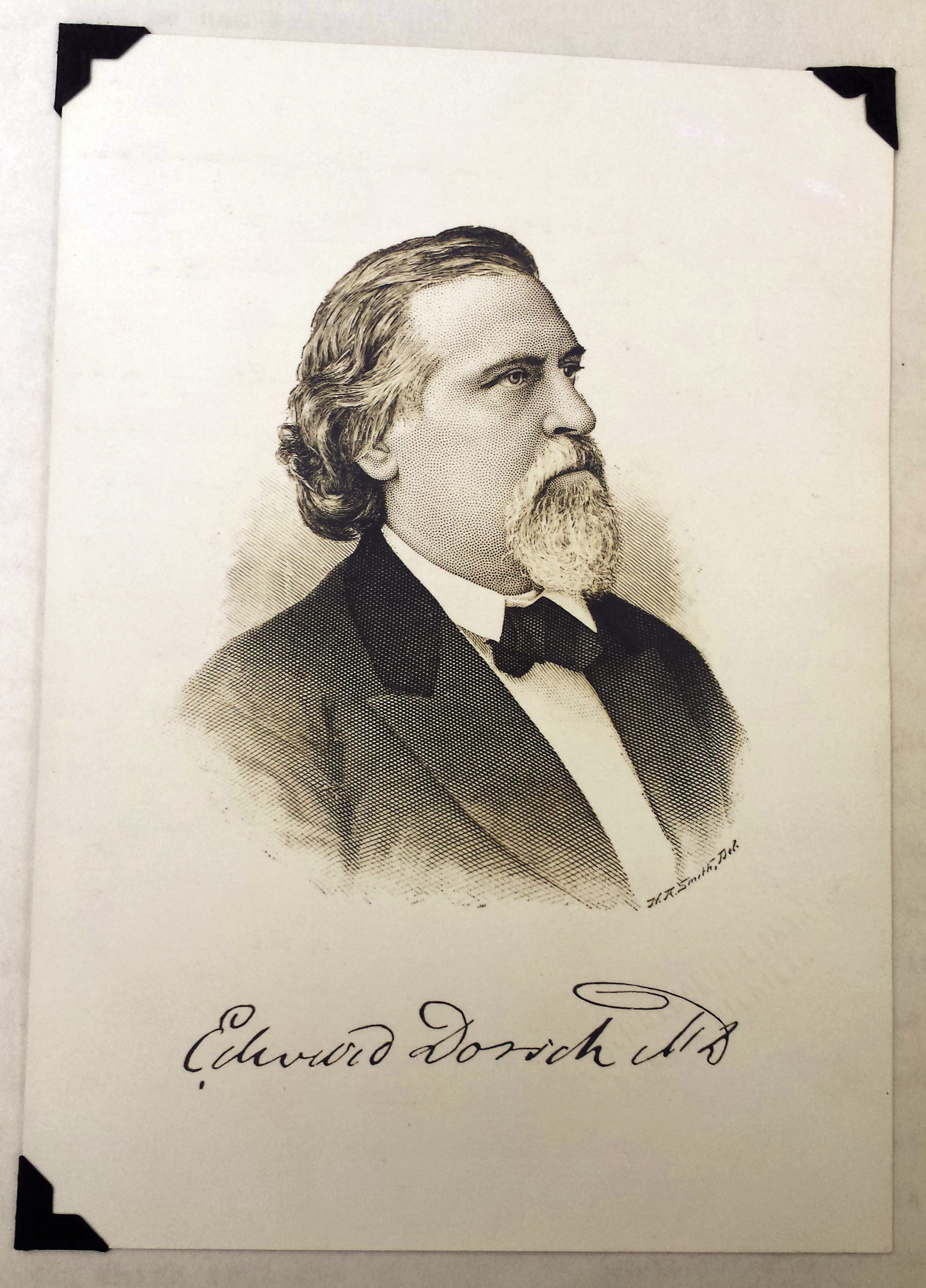
Fig. 5: Portrait of Eduard Dorsch, in: Carlson 1928.
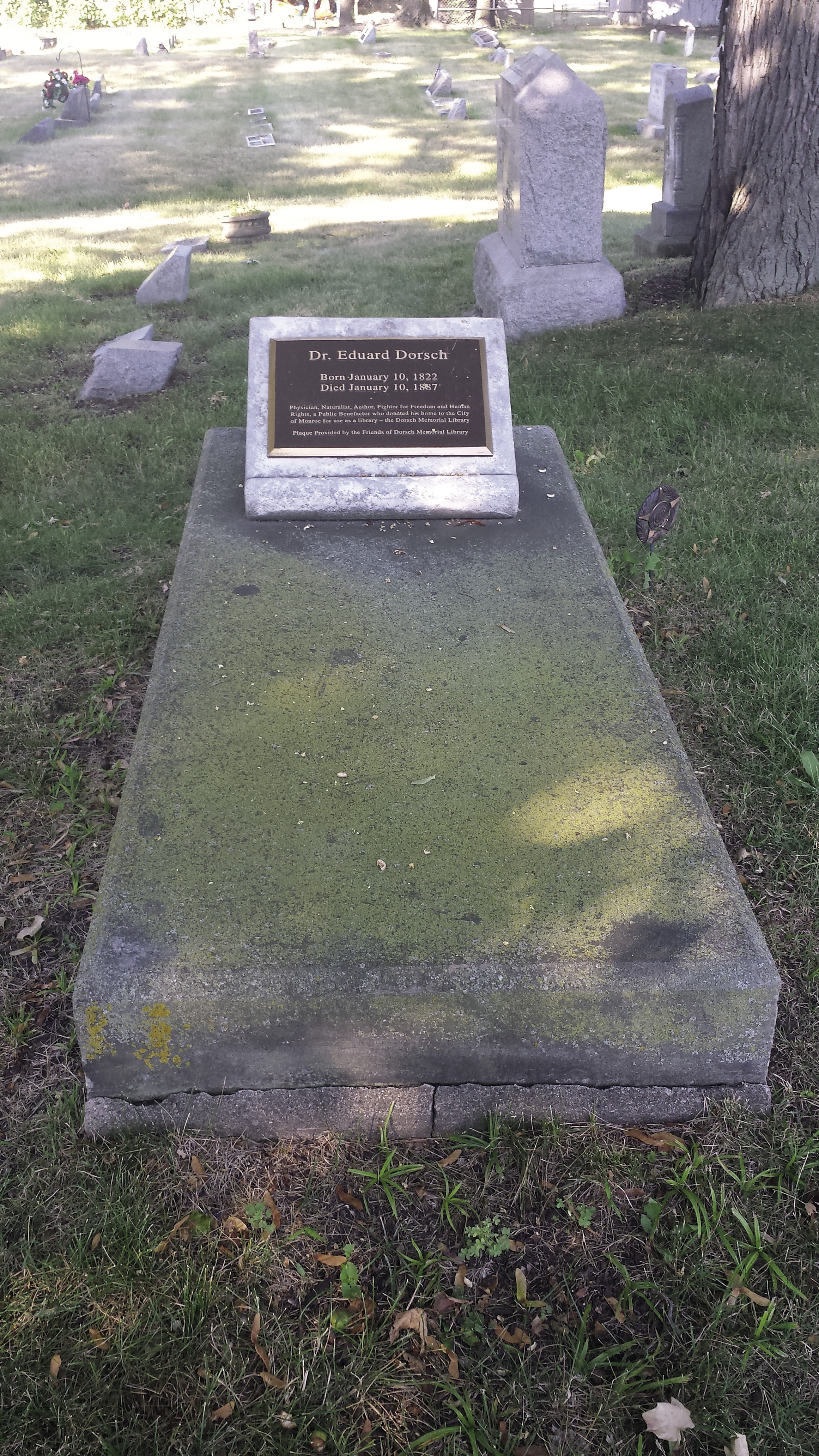
Fig. 6: Dorsch's grave in the Woodland Cemetary in Monroe, Michigan. Source: Reinhard Andress
When his wife Augusta died in 1914, she donated their architecturally classic, yet simple house for library purposes to Monroe where it evolved into the Dorsch Memorial Library and still exists today (cf. http://monroe.lib.mi.us/dorsch-memorial-branch-library and fig. 7). Already in 1888 she had donated her husband’s significant collection of over 1600, largely medical books to the General Library of the University of Michigan. At the time of the donation, a Professor Thomas, probably from the University of Michigan, concluded his short biographical sketch of Dorsch as follows:
He was a man of wide and varied intellectual interests, read books omnivorously in half a dozen languages, and exhibited, in writing his native tongue, a marked literary talent. In 1874 he published a volume of poems, some of which give evidence of poetic gifts of a really high order (Michigan 232).
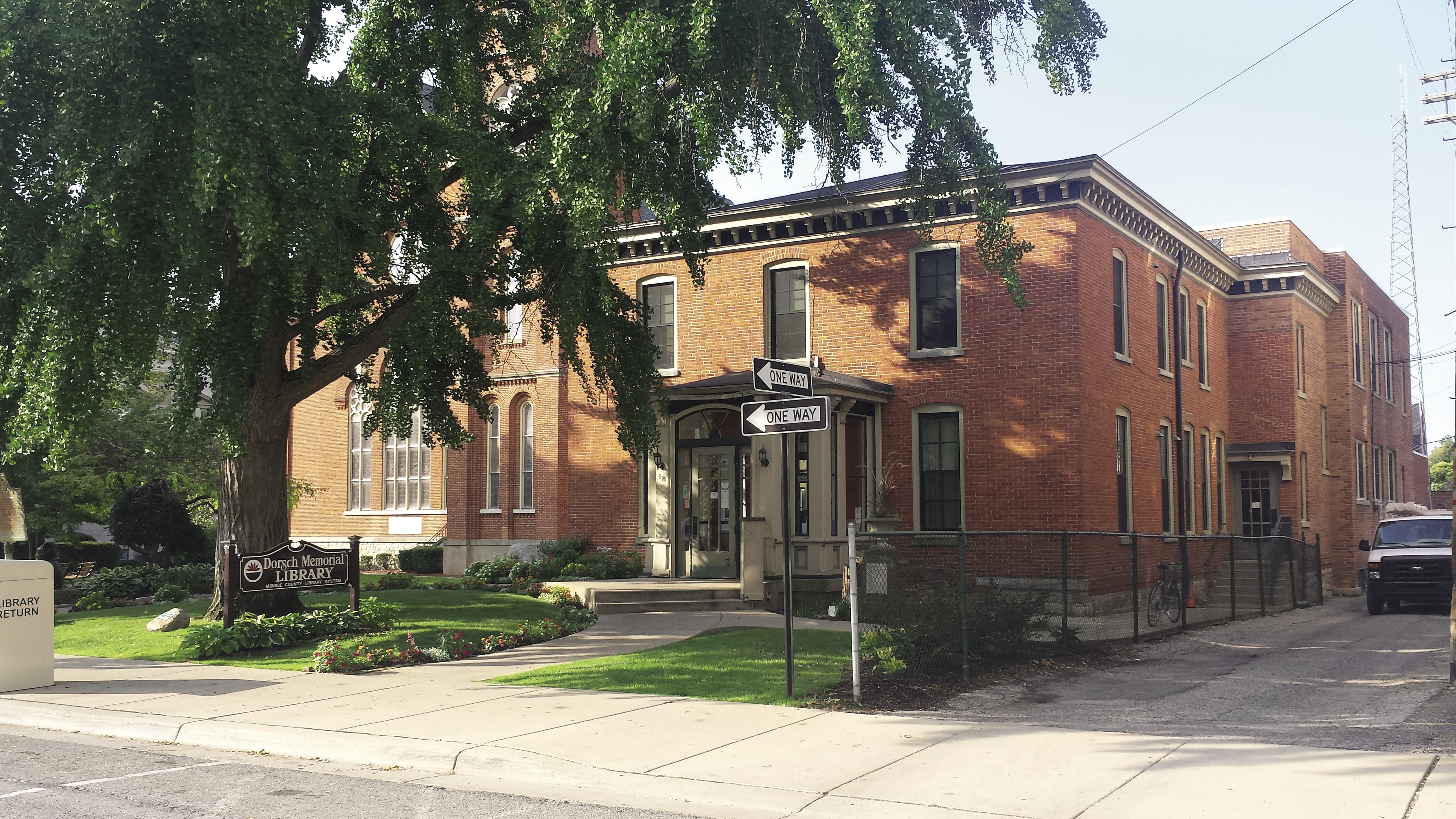
Fig. 7: The Dorsch Memorial Library in Monroe, Michigan. Source: Reinhard Andress
Prof. Thomas alludes to Dorsch’s literary interests and talents, to which we now turn. His love of truth, beauty and the natural world and his hatred of ignorance, hypocrisy and injustice were largely based, as mentioned above, on Enlightenment values and reflected in the poets he read, many whose complete works were contained in his own personal library. Freiligrath was an early influence, but Freytag, Goethe, Heine, Lessing and Schiller also bear mentioning. More specifically, Dorsch was motivated by strong feelings against the Catholic Church. With the failed revolution of 1848 no doubt still fresh in his mind, he published Kurze Hirtenbriefe an das deutsche Volk diesseits und jenseits des Oceans in 1851, not long after having arrived in the United States. Consisting of 50 sonnets, the booklet proposes to uncover the truth about the Church in Rome: “Du sollst sie seh’n auf ihren sieben Hügeln, / Von wo Sanct Peter seine Netze breitet / Und sich bemüht den freien Geist zu zügeln” (Dorsch 1851: 5). With biting irony and satire, the sonnets proceed to rail against the corruption of the Church, above all its priests and popes in cahoots with the political powers that be. Poetry and reason are to be the tools in the struggle against the Church: “Mit der Vernunft steht künftig sie [die Poesie] im Bunde, / Das Sonnenlicht ist strahlender und wärmer, / Und strömt begeistert von des Dichters Munde” (Dorsch 1851: 6). In the spirit of early emigration to the United States, he sees it as an opportunity for freedom from Church repression, as we read in the concluding sestet of the final sonnet:
Ihr fühlt euch leicht, dem ird’schen Druck entronnen,
Werft auch den geistigen von euch und wagt
Euch ohne Vormund in des Lebens Wonnen.
Die neue Zeit, die allenthalben tagt,
Sei nicht umsonst an euch vorbeigeronnen, -
Kämpft mit voran, der Feige nur verzagt. (Dorsch 1851: 34)
Some 25 years later, Dorsch published Parabasen in 1875. The title alludes to the form of these twelve further poems that hark back to ancient Greek comedies when the actors and/or chorus stepped out of their roles and addressed the audience directly about random topics, including the many foibles of mankind. In Dorsch’s version of the ancient form, the anti-clerical attitude remains, as well as the irony and satire, but they have now assumed a more distanced and melancholic tone. Having served as a physician for over 25 years in the “Städtchen” (Dorsch 1875:10) of Monroe, he has had the opportunity to observe the many follies of human behavior from squandered resources to corrupt politics, aside from the brutality of the American Civil War. He is skeptical about unbridled material progress, harbors doubts about the extremes of women’s emancipation, and chastises many injustices. The hopes he held out for societal renewal in the United States free from Church influence appear dashed. Yet, almost as if in desperation, he scrambles to end his Parabasen with the same hope as in the Hirtenbriefe, albeit entrusting only the “Yankees” (i. e. the Northerners) with the potential to learn from the mistakes of the old world, and for whose cause of the Republic the German intellectual should continue to fight:
Der Yankee wird ihr Beispiel seh’n und sich dran reformiren,
Wenn es gelingt vom Pfaffen ihn bald zu emanzipieren.
Dies ist als einz’ger Hoffnungsstrahl dem Menschenfreund geblieben,
Der thöricht es nicht lassen kann die Republik zu lieben.
Er muß erst lernen, daß sein Ziel allein hier liegt auf Erden,
Daß, wenn er selig werden will, er es schon hier muß werden.
Dies ihm zu lehren ist dir Pflicht; das Schwert drum aus der Scheide,
Du deutscher Denker! ja, das Schwert des Geistes, deutscher Heide! (Dorsch 1875: 62)
Whereas the Hirtenbriefe and Parabasen are more pamphlets than books per se, Dorsch did publish a substantial collection of his poems in 1884,11 which Dorsch culled from his many unpublished poems.12 Under the title of Aus der Alten und Neuen Welt, the poetic forms and topics are wide-ranging and give us insight into Dorsch’s broad education and panorama of interests. In the group of poems under the title of “Exodus,” we read confirmation that his anti-clerical stance led to his emigration:
Ich will dir auch sagen, was mich vertrieb:
Ich hatte die Heimath so lieb, so lieb,
Und wollte sie glücklich sehen;
Ich habe geschrieben manch ernstes Wort,
Ich sprach: Jagt eure Drohnen fort!
Da war es um mich geschehen.
Die Pfaffen sagten, ich hätte geglaubt,
Was nach der Bibel nicht erlaubt,
Ich sei ein Ketzer vor allen;
Das wurmt mich auch am grünen Rhein,
Daß unaufhörliche Litanei’n
Mir in die Ohren schallen. (Dorsch 1884: 53–54)
In addition, Dorsch writes of romantic memories of the “Heimat,” includes love poems, and expresses a deep, pantheistic love of nature, no doubt influenced by Spinoza. There are many impressions of the new world, including praise for the country’s development, some of it in the form of occasional poetry. As one might expect and as an abolitionist, he accepted the Civil War as necessary. Irony and satire still come through regarding the Church and human failings, but they are not as front and center as in the Hirtenbriefe and Parabasen. These are ultimately the poems of a slowly aging man looking back on the twists and turns of his emigrant life. Such poetry was not atypical of the generation of educated Forty-Eighters forced into exile, many of them ending up in the American Midwest. Their publications of poetry were numerous but are largely forgotten today, including Dorsch’s, with only a few writers such as Caspar Butz (1825–1885) or Emil Dietzsch (1829–1890) achieving a modest level of recognition. Nonetheless, Dorsch can be counted among those Forty-Eighters who contributed to the beginning of German-American literature in the United States (cf. Hofmeister 229ff.).
As an enlightened physician with strong botanical interests, it does not surprise us that Dorsch’s anti-clerical stance also developed out of his defense of science against the fanaticism and superstitions of the Church. Aside from defending Darwin’s teachings in Parabasen, he also mocks what the Church calls science:
Die Krankheit ist in unsern Leib durch Sünde eingezogen,
Durch Adams Fall, so lehren uns die neuen Pathologen;
Und einfach ist die Therapie der frommen Therapeuten,
Ganz überflüssig werden da Doktoren, Pharmazeuten;
Das Handauflegen heilt ja stets, auch oft die letzte Oelung. (Dorsch 1875: 23–24)
In the poem “Phantasie und Wissenschaft” in Aus der Neuen und Alten Welt, he continues his mocking tone and advocates again for the independence of science, so long a handmaiden of religion and now advancing so strikingly in the 19th century. With instruments in hand, comets no longer instill fear and science is on the path to understanding the world on the basis of reason:
O, allen Segen auf die Wissenschaft,
Die unsrem Leben nahm des Todes Schrecken!
Die uns befreit aus finstrer Geisteshaft,
Den goldnen Funken der Vernunft zu wecken! (Dorsch 1884: 221)
Although Humboldt was not so public about his distrust of religion as Dorsch and certainly held back his opinion in his culminating work, Kosmos, his letters to Varnhagen von Ense reveal that, as Dassow Walls has stated, he “pulled no punches in his contempt for the clergy” (Dassow Walls 2009: 308). To give just one example from a letter to Varnhagen in 1842, while discussing David Friedrich Strauss’s controversial books about Christianity, Das Leben Jesu, kritisch bearbeitet (1835–1836) und Die christliche Glaubenslehre (1840), Humboldt clearly sympathizes with the German liberal Protestant theologian:
[…] man lernt daraus nicht bloß, was er nicht glaubt, und was mir minder neu ist, als vielmehr, was alles von den schwarzen Männern geglaubt und gelehrt worden ist, die der Menschheit jetzt wieder neue Bande anzulegen verstehen […] (Humboldt 1860: 111).
Since the letters to Varnhagen von Ense were published both in Germany and the United States in 1860, it is conceivable that Dorsch read them and found in Humboldt a companion in his criticism of the clergy, aside from a more general and congruent belief in the power of science to reorder the world. In the same poem cited above, “Phantasie und Wissenschaft,” Dorsch also talks of the balance (“Gleichgewicht”) of nature and how in it “das All nur lebt und webt” (Dorsch 1884: 221). These lines resonate strongly with Humboldtian science and his idea of “Alles ist Wechselwirkung”.
Dorsch’s anti-clericalism, belief in reason and the interwoven cause and effect of science are also themes throughout his Humboldt poem, perhaps most clearly in the following stanza:
Erobernd fasst sein Geist die Welten,
Befreit vom alten Lügennetz
Das ewige Naturgesetz,
Das künftig nur allein wird gelten.
Hoch auf des Wissens Thron erhoben
Sieht er das reine Menschenthum,
Daß Geist und Welt in Eins verwoben,
Spricht laut sein Evangelium.
As the poem states elsewhere, Humboldt, “in Göttergleiche,” has become the new “Hohenpriester” of nature. Dorsch advocates for Humboldt’s science in order that his 19th century audience might also become “des Lichts Apostel.” The language may be cloaked in religious terms, probably motivated by the solemn occasion, but the difference lies in Humboldt’s and Dorsch’s disdain for “[d]es Glaubens morschen Stab” and in standing “erkennend” before the cosmos. Given Dorsch’s biography, it is not difficult to understand his enthusiasm for Humboldt and why he chose to write an occasional poem for his 100th birthday, thus contributing to festivities that marked the highpoint of Humboldt’s popularity in the United States.
Das Buch der Deutschen in Amerika (1909). Herausgegeben unter den Auspicien des Deutsch-Amerikanischen National Bundes. Philadelphia: Walther’s Buchdruckerei, 1909, p. 375: http://archivaria.com/BdDA/BdDA3.html#375 (checked on 05/02/2018).
Carlson, Harold G. (1928): “Eduard Dorsch, His Life and Works”. A Thesis Presented to the Faculty of the Faculty of the Graduate School in Partial Fulfillment of the Requirements for the Degree of Master of Arts, Cornell University, Itaca, New York, June 1928. Typoscript only as held by the Dorsch Memorial Library in Monroe, MI, USA.
Dassow Wells, Laura (2009): The Passage to Cosmos. Alexander von Humboldt and the Shaping of America. Chicago and London: The University of Chicago Press, 2009.
Dorsch, Eduard (1851): Kurze Hirtenbriefe an das deutsche Volk diesseits und jenseits des Oceans. New York: E. Magnus, 1851.
Dorsch, Eduard (1875): Parabasen. Milwaukee: Druck und Verlag des „Freidenker“, 1875.
Dorsch, Eduard (1884): Aus der Alten und Neuen Welt. Gedichte. New York: The International News Company, 1884.
Dorsch, Eduard (date unknown): “Sketch of my life.” Photocopy contained the “Dr. Dorsch” file in the Dorsch Memorial Library in Monroe, MI, USA.
“Dr. Edward Dorsch” (1887). In: Monroe Democrat, Jan. 13, 1887. Photocopy of the obituary as contained in the file “Dr. Dorsch” in the Dorsch Memorial Library in Monroe, MI, USA.
Hofmeister, Rudolf A. (1976): The Germans of Chicago. Champaign, IL: Stipes Publishing Company.
Humboldt, Alexander von: Briefe von Alexander von Humboldt an Varnagen von Ense aus den Jahren 1827–1858. Leipzig: F. A. Brockhaus, 1860.
“Humboldt Centennial” (1869). Detroit Free Press, Vol. XXXIV, No. 310 (15.9.), p. 1.
Michigan. University of Michigan. Regents’ Proceedings. 1886–1891, pp. 231–232: https://quod.lib.umich.edu/u/umregproc/acw7513.1886.001/237 (checked on 05/02/2018).
Monroe County Library System: History: http://www.monroe.lib.mi.us/history-dorsch-memorial-branch-library (checked on 05/02/2018).
1 Region of the eastern North American coast explored by the Vikings.
2 A 19th century reference to England as the land of melancholy, and in turn alluding to the spleen as the organ connected to that mood in the humoral medicine of the ancient Greeks.
3 An island in the Aegean Sea celebrated as the birthplace of Venus.
4 Reference to Friedrich Schiller’s poem, “Das verschleierte Bild zu Sais,” in which a young man travels to Sais in Egypt to learn secret wisdom from the priests. There, he is confronted with a veiled image of the ultimate truth that is forbidden to reveal. He nonetheless attempts to unveil the truth, is punished with profound grief and soon dies, never revealing what he saw. Humboldt, on the other hand, has paid no heed to religious prohibitions and has pushed relentlessly ahead in the pursuit of knowledge.
5 Today used in the sense of a guitar pick, Dorsch most likely meant it as a tool or weapon for hitting as derived from Latin and Greek.
6 Compass with finding device.
7 The reference is to Alexander the Great (356 BC-323 BC), ruler of the Ancient Greek Kingdom of Macedon, who established one of the largest empires of the ancient world. Humboldt’s empire is, of course, one of science.
8 According to legend, the Greek pre-Socratic philosopher Empedocles (c. 490 BC-c. 430 BC) died by throwing himself into Mt. Etna to prove his immortality. The reference here is ironic in the sense that Humboldt’s pursuit of knowledge is a “happy” version of Empedocles in that it does not need a suicide to prove its immortality, as further evidenced by the occasion of the poem.
9 In ancient Greek religion and mythology the god of nature, thus symbolically lending Humboldt a divine status.
10 Manes, the spirits of the dead in the ancient Roman religion, here in the sense of being worthy of claiming to follow Humboldt’s footsteps.
11 Prof. Thomas may have been referring to this volume above although he has apparently made a mistake with the year of publication. In any case, there is no major book publication by Dorsch in the year 1874.
12 Dorsch’s unpublished works are extensive and are to be found in over 35 notebooks. Aside from poems, there are dramas, short prose pieces and translations. In the Chicago Historical Society, they can be found under the entry http://www.chsmedia.org:8081/ipac20/ipac.jsp?session=15J178P318E14.47787&profile=public&source=~!horizon&view=subscriptionsummary&uri=full=3100046~!65621~!2&ri=1&aspect=subtab112&menu=search&ipp=20&spp=20&staffonly=&term=Germania+Club+of+Chicago&index=.GW&uindex=&aspect=subtab112&menu=search&ri=1 although Dorsch is not specifically mentioned there. Additional notebooks are archived in the Dorsch Memorial Library in Monroe, MI.